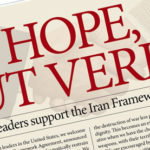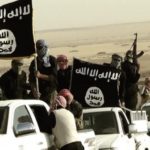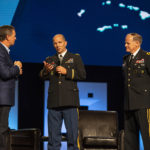WASHINGTON (ABP) — Three Baptist leaders said it would be a mistake to ban Muslims from service in the United States military based on the Nov. 5 mass shooting that killed 12 soldiers and one civilian and wounded more than 40 at Fort Hood in Texas.
Amid speculation that Maj. Nidal Malik Hasan, charged with 13 counts of premeditated murder, may have been motivated by religious hatred, several conservative leaders have suggested banning Muslims from the military as a security measure.

Brent Walker
|
Writing for the On Faith blog of the Washington Post, however, three high-profile moderate-to-progressive Baptists said such a move would be an overreaction and an unconstitutional infringement on soldiers' religious freedom.
"Religion should only disqualify someone from active military service if the religious beliefs and practices would substantially impair the performance of one's duties in the military," wrote Brent Walker, executive director of the Baptist Joint Committee for religious liberty.
Both a lawyer and an ordained Baptist minister, Walker said the government is responsible not only to protect a soldier's free exercise of his or her faith, but sometimes to accommodate soldiers' religion through supplying chaplains. He said the military, along with prisons, is one of the few settings where the Constitution allows for a chaplain to be financed with public money.
"Recent events at Fort Hood should not cause us to look askance at the accommodation of religion in the military or to condemn Islam in particular," Walker said. "One deranged soldier should not overshadow the thousands of faithful Muslims admirably serving in the U.S. military."

Welton Gaddy
|
Welton Gaddy, president of the Interfaith Alliance and pastor for preaching and worship at Northminister Church in Monroe, La., described the Fort Hood shooting as "a national tragedy perpetrated by an individual clearly motivated by hatred and possibly even by a bastardization of his own Muslim faith." Backlash in the form of anti-Muslim rhetoric, he observed, "deepens the tragedy and its repercussions."
Sign up for our weekly edition and get all our headlines in your inbox on Thursdays
"Using this incident to instill a hatred and mistrust of Muslims proudly serving in our military damages its integrity and ignores the religious freedom assured in the Constitution that the men and women serving in our armed forces are sworn to defend," wrote Gaddy, a former president of the Alliance of Baptists also active in early leadership of the Cooperative Baptist Fellowship.
Gaddy said disqualifying someone from service because of his or her religious affiliation "would be a clear violation of the U.S. Constitution and a broadside to the nation's historic respect for religion."
"The fitness and effectiveness of a soldier cannot be determined by the soldier's religion or lack of thereof," he wrote.
The U.S. military has worked hard to recruit Muslims since the start of the wars in Afghanistan and Iraq. The Pentagon sets the official count of Muslims on active duty at about 3,400 — out of a total force of 1.4 million. The military doesn't require personnel to disclose their religion, however, and some estimates place the actual number of Muslims serving as much as 10,000 higher than the Department of Defense number.
When he endorsed Barack Obama for president in 2008, former Secretary of State Colin Powell mentioned the death of a Muslim soldier, Kareem Rashad Sultan Khan of New Jersey, who was killed in Iraq in 2007 and is buried in Arlington National Cemetery. Powell said he brought it up because he was troubled by false intimations that Obama is a Muslim and that even if he were, there is nothing wrong with being a Muslim in America.

Robert Parham
|
Robert Parham, executive director of the Baptist Center for Ethics, said constitutional and moral arguments or pointing to the loyalty of people from other faith traditions do little to sway some conservative Christians fed on anti-Islamic rhetoric from talk radio, blogs and pulpits.
"About the only viable counterforce is for the majority of Christian ministers to stand up for goodwill American Muslims and to speak continuously for the separation of church and state," Parham wrote in an On Faith article that also appears on BCE's EthicsDaily.com website. "American Christian leaders need to get off the fence and face those on the fringes of faith."
In an earlier editorial Parham said the Fort Hood shootings present Americans with two choices. One is to view Hasan as representative of American Muslims and the other is to refuse to project the harmful acts on one individual on an entire faith group.
The Baptist Center for Ethics, a partner organization of the Cooperative Baptist Fellowship founded in 1991, has been working a year on an hour-long documentary titled "Different Books, Common Word: Baptists and Muslims," set to air on ABC television stations beginning in January.
Produced through an arrangement with the Islamic Society of North America and the Interfaith Broadcasting Commission, the film will also be available on DVD.
Other voices, meanwhile, pushed back at arguments they described as apologetics for Islam. Radio show host Rush Limbaugh complained that President Obama and liberals blame everything but Islam for the Fort Hood shootings. He objected in particular to labeling people who act as Hasan did as "extremists."
"They are not extremists," he said. They are mainstream in their sect of Islam. They are mainstream. There are hundreds of millions of them. They are not extremists."
Randy Wallace is pastor of the First Baptist Church of Killeen, Texas, the city adjacent to Fort Hood. Noting that Killeen was also the site of a shooting rampage at a Luby's Cafeteria that killed 24 people in 1991, Wallace said it was statistically improbable that such a relatively small town would experience two mass murders within 20 years.
"If this was a Muslim terrorist thing, to not call it that is an insult to people who know different," Wallace said, according to the New York Times.
–Bob Allen is senior writer for Associated Baptist Press.














We seek to connect God’s story and God’s people around the world. To learn more about God’s story, click here.
Send comments and feedback to Eric Black, our editor. For comments to be published, please specify “letter to the editor.” Maximum length for publication is 300 words.